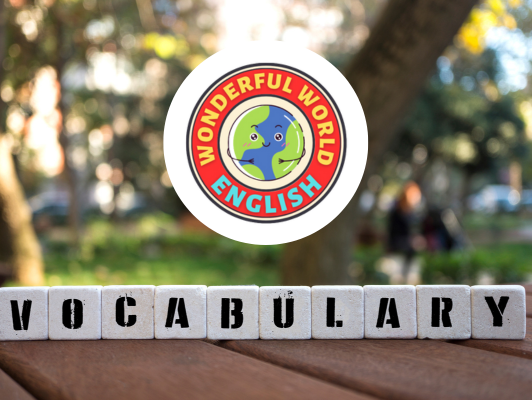Contents
Toggle
Meet David De’ Ath, founder, editor, and writer at Wonderful World English. With his extensive background as an English teacher, David provides valuable insights and practical tips on ESL for students and teachers alike.
As 12th graders edge closer to the culmination of their high school journey, their grasp of the English language plays a pivotal role in preparing them for the challenges ahead.
The vocabulary that high school seniors encounter is not just a list of words, but a toolkit for understanding complex literature, engaging in in-depth discussions, and crafting persuasive arguments.
It serves as a bridge to the academic and professional worlds where nuanced language and precise terminology are invaluable.
The transition from high school to higher education or into the workforce demands a command of sophisticated and domain-specific vocabulary.
The significance of these vocabulary words extends into standardized testing, such as the SAT or ACT, where a strong lexicon can greatly impact students’ scores and subsequent opportunities.
High school seniors must be able to interpret, employ, and comprehend an advanced level of vocabulary to navigate the texts and conversations they will meet in their future endeavors.
The 12th grade vocabulary words must be incorporated into everyday use to elevate students’ literacy and bolster their confidence in the English language.
Regular exposure and practice ensure that students are well-equipped to communicate effectively and with clarity, whether in writing or in speech.
Achieving literacy proficiency at this stage is a vital step toward success in any field they choose to pursue after high school.
Vocabulary Development
To effectively enhance one’s vocabulary in the 12th grade, students must adopt targeted learning strategies and put a significant emphasis on contextual understanding.
Learning Strategies
Flashcards remain one of the most tried-and-true methods for students to memorize vocabulary words.
They can use physical cards or digital apps to review and test themselves.
Regular practice is paramount in cementing these words in one’s memory.
Additionally, engaging in both reading and writing exercises that incorporate these new words can act as a practical application, reinforcing their usage and meanings.
Keeping things fun and engaging is key to getting best results in the classroom.
For some great games and activities to teach vocabulary effective, the guide below has you covered!
Related: Fun Vocabulary Activities: 10 Ways to Boost Word Skills
Contextual Understanding
Understanding the context in which words are used goes beyond mere memorization.
Students should read a variety of texts, ranging from fiction to academic journals, to observe vocabulary words applied in different scenarios.
This exposure helps them grasp the nuances of language.
Writing assignments that encourage using new vocabulary in proper context can also enhance their ability to articulatecomplex ideas effectively.

Vocabulary in Standardized Testing
The SAT is a critical college admissions test where a strong vocabulary can significantly impact a student’s score.
Excelling in the verbal sections of the SAT demands familiarity with a broad range of academic vocabulary.
SAT Preparation
Students preparing for the SAT should concentrate on Tier 2 academic vocabulary—words that are frequently encountered across different subject areas and contexts.
Effective study tactics include:
- Flashcards: Creating cards with the word on one side and its definition on the other side fosters active recall.
- Practice Tests: Regularly taking full-length SAT practice tests helps students familiarize themselves with the style of vocabulary questions they will encounter.
- Contextual Learning: Learning words in context from reading materials helps in understanding the subtle nuances of each word.
For direct access to vocabulary tailored to 12th graders, students can refer to resources like Vocabulary.com, which offers extensive lists of words that are both taught and tested at this grade level.
Students may engage in various exercises, such as matching words to definitions or completing crossword puzzles featuring potential SAT vocabulary.
It is beneficial to understand the language of standardized tests as provided by resources like The Language of Standardized Tests on Vocabulary.com.
This comprehension can lead to more confident navigation of test directions and questions.
Additionally, 120 essential words are recommended for mastery by 12th-grade students, as seen on 120 Words Every 12th Grader Should Know.
Prioritizing these words, which are commonly found in literature and textbooks, can give students an edge in the verbal sections of the SAT and other college admissions tests.
Related: How to Teach Vocabulary to ESL Students: Teacher’s Guide

Advanced Vocabulary Usage
A strong vocabulary is crucial for effective communication and can greatly improve one’s writing and analysis skills.
It allows individuals to express ideas with precision and engage with complex literary texts with greater insight.
Writing Enhancement
Incorporating advanced vocabulary into writing serves not only to enhance the language but also to add clarity to the message conveyed.
It avoids the prosaic use of common phrases, bringing originality and freshness to the content.
For example, students could replace the overused term ‘beautiful’ with ‘florid,’ if they wish to imply a more ornate or elaborate beauty.
While a precocious use of vocabulary can demonstrate advanced knowledge, it is important to ensure that these termsare used appropriately to maintain readability and coherence.
- Hackneyed: Commonplace; overused
- Original: The sunset was beautiful.
- Enhanced: The sunset was bathed in a florid tapestry of colors.
- Ephemeral: Lasting for a very short time
- Original: The moment was fleeting.
- Enhanced: The moment was achingly ephemeral, gone as quickly as it came.
- Rancorous: Bitter or resentful
- Original: She had harsh feelings.
- Enhanced: She harbored rancorous feelings that tainted her every word.
- Assiduous: Showing great care and perseverance
- Original: He worked very hard.
- Enhanced: He was assiduous in his studies, ensuring every detail was perfect.
Literary Analysis
Advanced vocabulary is indispensable for conducting literary analysis.
These terms provide nuanced insights and a more accurate interpretation of texts.
When discussing literary themes, one may refer to a character’s actions as ostentatious to critique the display of wealth or status.
Alternatively, an assiduous reader might impute motivations to a character based on their careful analysis of the text’s subtleties.
- Ostentatious: Characterized by vulgar or pretentious display
- Analysis: The character’s ostentatious behavior serves as a commentary on the transient nature of wealth.
- Nuance: A subtle difference in or shade of meaning, expression, or sound
- Analysis: The nuanced language of the poem reflects the complexities of the human psyche.
- Impute: Represent (something, especially something undesirable) as being done or possessed by someone
- Analysis: The critic imputes the protagonist’s downfall not to fate, but to a series of flawed personal choices.

Vocabulary for College Readiness
A strong command over advanced vocabulary is crucial for students’ success beyond 12th grade, particularly in standardized college admissions tests and in understanding complex academic texts.
Mastery of higher-level words facilitates a better grasp of course materials and promotes academic confidence.
Assessment Relevance
Students typically encounter a significant number of challenging words in standard assessments.
For example, in college admissions tests, words such as venerable—worthy of a great deal of respect, often because of age, wisdom, or character—and sagacity—the quality of having or showing keen mental discernment and good judgment—are often used to test a student’s comprehension and higher-order thinking skills.
It’s not only about recognizing these words; students must also be able to apply their meanings within different contexts.
Thus, preparing for these assessments often requires diligent study from an expansive list of vocabulary that is relevant to 11th and 12th graders.
Application in Coursework
The application of mature vocabulary in coursework is essential for clear articulation of complex ideas.
In language courses or when analyzing literature, terms like suppress—forcibly put an end to—and vindicate—clear (someone) of blame or suspicion—can significantly alter one’s interpretation of a text.
Academic language in textbooks often assumes a student’s familiarity with such vocabulary, and without understanding these words, a student might struggle with the depth of comprehension required for college-level work.
Therefore, vocabulary development is crucial in the 10th and 11th grades to lay the groundwork for future success.
The correlation between a student’s vocabulary range and their academic achievement is well-acknowledged, making vocabulary development an imperative component of college readiness.
For a complete guide on the BEST books to boost vocabulary, check out the link below!
Related: Books About Vocabulary: Teacher’s Top Picks

Challenges and Solutions in Vocabulary Acquisition
Mastering vocabulary is essential for 12th graders aiming to succeed academically.
However, the journey to vocabulary acquisition is often fraught with obstacles. Targeted strategies can enhance understanding and retention of complex words.
Common Pitfalls
Circuitous Learning Methods: Students may find themselves in a cycle of memorizing vocabulary without truly understanding the words, leading to quick forgetfulness.
Surreptitious Communication Barriers: The fear of using new vocabulary in actual conversation can hinder the process of making these words a functional part of one’s lexicon.
Overlooking Contextual Clues: Ignoring the context in which words like “spurious” or “intrepid” appear is a missed opportunity for deeper comprehension.
Learning in Isolation: Trying to learn words like “demagogue” or “nonchalant” without associating them with real-life scenarios or related concepts can result in a lack of practical application.
Effective Remedies
Integrating New Vocabulary: Regular use of new terms, in both oral and written forms, ensures words such as “evanescent” and “transient” become ingrained.
- Active Recollection: Encourage students to recall the definitions of words like “scrutinize” and “wary” through quizzes or peer discussions.
- Contextual Learning: Stress the importance of seeing words like “frugal” and “fortuitous” in context for more natural absorption and understanding.
Multifaceted Approaches: Effective strategies to understand words such as “capitulate” and “conciliatory” include Vocabulary Acquisition Strategies.
They recommend frequent encounters with the word, richness of instruction, and extension of word use beyond the classroom.
- Rich and Diverse Resources: Literature, articles, and textbooks recommended by Vocabulary.com help illustrate how words such as “anecdote” and “camaraderie” function in various disciplines.
- Purposeful Practice: Encourage exercises that use newly learned vocabulary in sentences and discussions to reinforce words such as “collaborate” and “adulate” effectively.

Conclusion
Enhancing vocabulary is crucial for 12th graders as they prepare for the transition to college and the professional world.
Effective vocabulary development not only aids in acing standardized tests like the SAT but also enriches communication skills, crucial for academic success and future career opportunities.
By adopting targeted learning strategies, engaging with diverse reading materials, and applying vocabulary in various contexts, students can significantly improve their command of sophisticated language.
This preparation is indispensable for navigating the complexities of higher education and beyond, ensuring students are well-equipped to express ideas with clarity and confidence.
We hope you find value in this information; you can contact us if you require any support.
Have a wonderful day!
Image Attribution: All images licensed via canva.com





